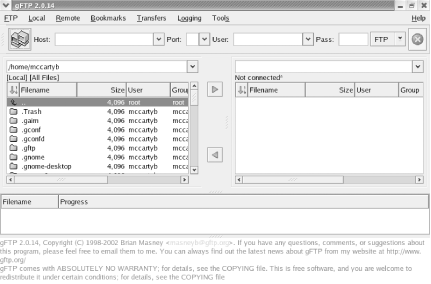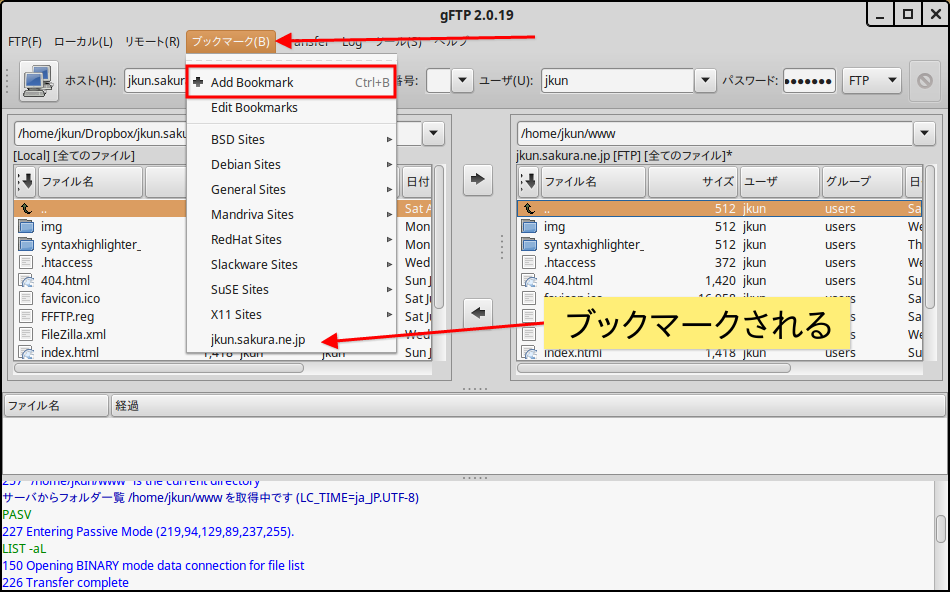

- #Linux gftp how to#
- #Linux gftp install#
- #Linux gftp update#
- #Linux gftp software#
- #Linux gftp license#

*Note: The configuration file, changes might be in form of adding a line, modifying an existing one or uncommenting a line.īut before editing the default changes we will make a copy of the original.
#Linux gftp install#
Step 1: Installationīased on the type of Linux Distribution you are using, the command for installation might vary.įor Linux Ubuntu/Debian based systems, you can install VSFTPD as simple as executing the following command: sudo apt-get install vsftpdįor Red Hat/CentOS: execute the following command
#Linux gftp how to#
Let us learn how to install VSFTPD Application in detail. conf file with configuration settings and then finally we’ll start the VSFTPD server.
#Linux gftp update#
Recommended: Before beginning with the installation process for any tool/software application in any Unix based system, it is recommended to fire an update command.įurther Process: To simply explain, we will now execute a simple “apt-get install” query to install the VSFTPD application, then we will move on to editing the. Let’s begin with the VSFTPD Installation. VSFTPD stands for “Very Secure File Transfer Protocol Daemon” VSFTPD is a default FTP Server for Unix Based Operating Systems like Linux Ubuntu, Fedora, CentOS, and RHEL distributions. It also supports FTPS, which is the extended community of FTP with security.
#Linux gftp license#
Here, we will use “VSFTPD”, which is an FTP server for Unix-like systems, it is Licensed under GNU General Public License and supports IPv6 and SSL.
#Linux gftp software#
Moving further, we will learn how to install the FTP Server Software Application on a Computer machine with a Linux Operating System. In Passive Mode: The Client initiates the Data connection by sending the data, and the server listens.In Active Mode: The Server Initiates the Data Connection, and the Client listens to a random port for incoming data connections from the server.These modes depend on, who initiates the Data Connection, Client or Server. Data Connection: This is a latter connection established for a specific purpose of transferring data.Īlong with Two Types of Connections, FTP works in Two different modes, Active and Passive FTP.Control Connection: This is an Initial Connection which is established soon as Login Credentials are sent and one of the TCP Port 20 or 21 is opened.In FTP, we have two basic connections, to begin with, Control Connection and a Data Connection. The connection is a simple relationship acquired between Two points. With easy access, a newbie, an inexperienced person can (accidentally) wipe out the FTP or any other major action easily.

Your login credentials like Username and Passwords are sent in clear text format.Few security points like upon using a simple Brute Force Attack, any outsider can gain access.Basically, transferring multiple files at an instance, simultaneously, will result in adding later files in a queue and not uploading every file at the same moment.With the above-mentioned Advantages, FTP does have a few Disadvantages: And finally, you can schedule a File transfer.In the case of an Interrupted Connection, your file will not be lost, instead, you’ll be able to resume the transfer where it dropped.

It allows you to transfer multiple amounts of Files and Directories/Folders.FTP server Type Files Transmission has many of its Advantages like


 0 kommentar(er)
0 kommentar(er)
